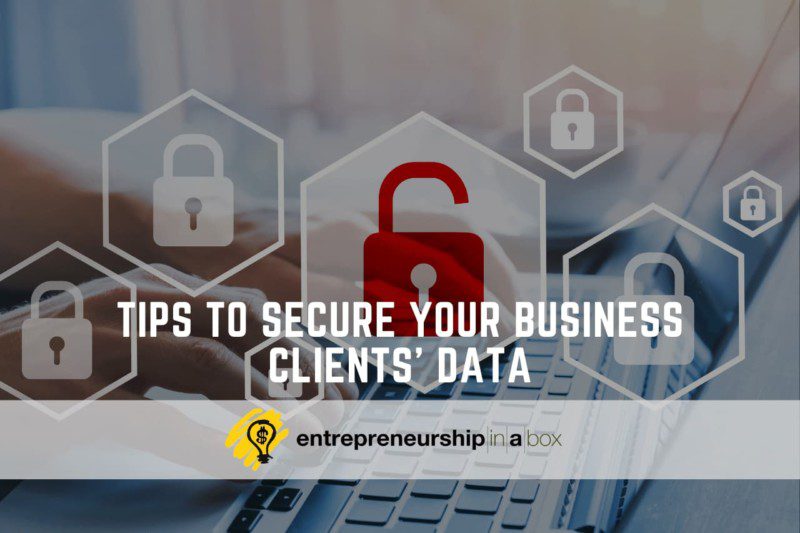When it comes to protecting the sensitive data that clients entrust to you, it’s crucial that you get every detail right.
Cybercriminals and hackers always pose a threat to businesses. It is crucial to have a secure data storage system in place in this digital age to fend off such assaults.
There are various methods you can use to protect the information of your company’s clients. Here, we’ll cover important things you can take to protect your clients’ data.
Tips To Secure Your Business Clients’ Data
- Make a data backup. In order to guard against ransomware attacks, data loss, and theft, a reliable backup solution is crucial.
- Take precautions to fend off phishing scams. Never enter your login information for any website or service into a social media account or email that you are not familiar with, as this is how hackers will attempt to steal it from you. Delete any suspicious links from the email at once if they request personal information, even if they appear to be from a reputable company.
- On every device that employees use at work, install anti-ransomware programs; these can defend against specific malware types, such as Trojans and keyloggers, without blocking all others (which makes sense, given that most users won’t understand how their devices operate).
Measures You Must Take To Secure Your Business Clients’ Data.
In the modern day, customer data protection has become essential. The number of cyberattacks has grown dramatically in recent years, so it’s critical to implement the necessary security measures to protect the data of your clients. It would help if you took the following actions to protect the data of your company’s clients:
Use a password management program like 1Password or LastPass to keep all of your passwords safely stored and out of reach of any internet-connected device (including smartphones). This makes it challenging for anyone who might gain access to your devices or network connections to access the usernames and passwords that are kept there, making them untraceable by hackers or other anyone who may wish to access them unlawfully.
Ensure Backup Of Data
Always ensure data backups. Although it should go without saying, it’s crucial to guarantee that the data of your corporate clients are consistently and safely backed up. If a calamity occurs, you’ll want to be able to quickly and inexpensively recover it without needing to invest in expensive repairs or replacements. Additionally, suppose you keep client information on a CD, DVD, or external hard drive (which could get damaged). In that case, those copies will also need to be recovered by someone with access rights within the organization who is familiar with how this works—hopefully, they are!
Take Measures To Avoid Phishing Attacks
Hackers who engage in phishing send emails to users in an effort to deceive them into clicking on attachments or links. Email, social media, or even text messages can be used to send these emails. Phishing emails are made to appear to be from a reliable source.
It’s crucial to inform your clients about phishing if they don’t know what it looks like in order to prevent them from falling for this kind of assault. There are some ways to prevent phishing: avoid clicking unnecessary links, don’t share your personal information on unsecured websites, change passwords regularly, etc.
Make Use Of Anti-Ransomware Applications
A form of software known as ransomware that encrypts your files and then demands payment to unlock them. Your files are typically permanently erased or locked if you don’t pay the ransom. Ransomware frequently spreads through email attachments and nefarious websites that impersonate trustworthy ones, such as banks or payment processors. The majority of people don’t know they are infected until their computers are corrupted and no longer function properly—at which point they may require assistance recovering from the attack in order to rescue their company data and other irreplaceable goods before they are permanently gone!
Encrypt Your Stored Files And Folders
Data is encoded using encryption so that only those with the proper access can read it. Although there are other encryption techniques, AES-256 bit encryption and the use of VPNs are the most popular.
If you use a VPN, it will also encode all your credentials and make it inaccessible to hackers. And if your router doesn’t natively support VPN connections, then you can simply change replace the outdated router with a new one, or you can purchase a new one to down the task. If you replace it, you will be able to maintain all your files, passwords, and settings.
Your data will be protected from external risks like viruses and hackers if it is encrypted.
There Are Many Ways To Keep Your Clients’ Data Safe And Secured.
There are numerous ways to safeguard and secure the data of your clients.
- Use a private computer only.
- Avoid utilising free WiFi.
- Never click on links in emails that are from unknown senders or open them (this includes attachments).
Conclusion
These are just a few strategies you can use to safeguard the information of your corporate clients. There are a tonne more steps to do, which we’ll cover in a subsequent article.





